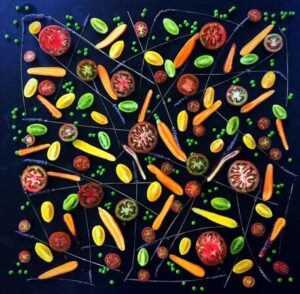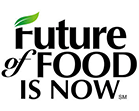
by Sarah Phillips
Bringing back food memories is vital for our future.
In modern times, we are disconnected from the tradition of the food that we consumed. It now comes boxed and wrapped up, sanitized to the point where no one can see the human connection anymore. But food encodes culture. Each dish tells a story about a group of people, their traditions, and their collective experiences. (link)
Foods we encounter throughout our lives leave embodied memories that frame our past, influence our present, and shape our future. What Proust described in Remembrance of Things Past — that our memories play an important part in our construction of self — also goes for us as a people, as members of one society or another. And food plays an important role in this.
While fruits and vegetables from across the globe can now land on our plates, many cultivars of native species have gone extinct. The current global food system depends on 30 cultivated plant species for its functioning, and three of these crops feed more than half of the world’s population . I believe this causes a disconnect in our lives or a sense of belonging. My 70 years of food memories – food that was once present in my childhood – are no longer available or are the same. Many fruits and vegetables that are still around, however, have changed drastically in size, flavor, color, shape, and are available year-round instead of seasonally.
For example, modern day apples are mealy, tasteless, and lead to more food waste and trash. Who can eat the huge apples we see in the supermarkets today? They are so huge, not like to small ones I remember eating out of hand as a child. Because of their large size, and an inability to eat all of it, we toss the apple as food waste or wrap it in plastic wrap for the fridge for keeping, leading to future plastic and/or food waste. (The cycle repeats itself.) Apples used to smell so fragrant. Heirloom or ugly apples, or the ones from my childhood, available in some sophisticated markets, have become my salvation.
Changing food, such as an apple, has changed my perception of where I belong and my sense of time – I am now a member of a mass produced food world where seasonality doesn’t matter, instead of a specialized one where new flavors and culinary experiences are to be discovered; it’s kind of boring, and places me in an insecure world in the face of climate change. I know there is a reduction in plant species, in general, and their varieties; many are monocultures, or are without adaptive genetic resilience. My feelings are accentuated by the patent and control of farmed seeds by a minority of transnational corporations that generate increasingly specialized varieties not accustomed to climate change or disease.
Recent studies have pointed to the importance of incorporating old wild cultivars back into the human diet to ensure food security to restore agricultural biodiversity by matching diverse plants and animals to the demands of land and a changing climate. Besides these heirloom fruits and vegetables offer a powerful emotional and physical connection to a shared cultural, and culinary past – perhaps creating a better connection of people with their food or being recognized as living windows to the past. This deep culinary connection to the past influences how we think about food and cherish it – not only the foods we grow and consume – but how we may want a better and healthier food system right now and for our future.
photo and styling by Sarah Phillips copyright 2024






